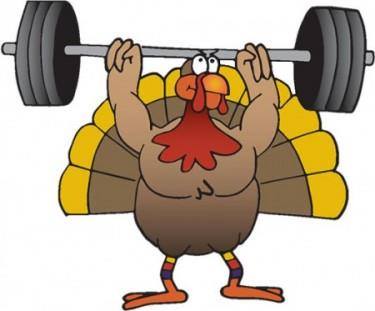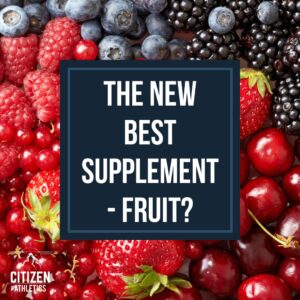Are you looking to improve your recovery? Reduce your muscle soreness? Possibly improve your performance in the gym?
Well you might want to eat some fruit!
Recovery is huge. People go to great lengths to improve their recovery from training.
This is usually aimed at reducing how sore you are after the workout, allowing you to come back and hit another good workout and not be limited.
No one likes it and people will go to great lengths to try and reduce muscle soreness. There are always new concepts coming out with big claims about providing better recovery – compression clothing, pneumatic leg pants, ice baths, cryotherapy chambers, and so many more. More often than not, these are just big placebos with some benefit in the short term that don’t appear to offer much in the long term. As well, the vast majority of these gimmicks are quite costly and inconvenient, making their utility quite low.
In contrast, we have a new, well sort of new, recovery option that has been gaining some attention recently.
Fruit!
Now you might be wondering
“Fruit? What are you talking about? Some secret fruit? Is this a secret new fruit supplement”
Nope, just the classic produce section – sort of.
Don’t be worried, I’m not going to try and rekindle the Acai craze or push some other superfood frenzy. Instead, we’re looking at fruit as a general.
Not exactly the standard kind of fruit that you’d grab out of your crisper in the fridge, but actually fruit supplements such as a powder or pills of multiple fruits condensed down into an easier item to consume.
A new systematic review and meta-analysis just came out looking at the effects of fruit supplementation on markers of muscle damage and performance abilities related to exercise.
For those that don’t know research terms, a systematic review is where the researchers go through all of the research on a topic, appraise the research, and review it for quality. A meta-analysis is where the researchers take multiple studies on a subject and combine their results. The goal with this type of research is to take every article on a subject, pool it together to reduce bias and increase the statistical power – allowing us to have more confidence in the results.
Over the last decade, there has been growing research on the topic of fruit supplementation, particularly for its possible benefits with performance and muscle soreness. The researchers went through the evidence that looked at fruit supplementation with exercise protocols, that compared to a placebo intervention, and measured for different markers of muscle damage, inflammation, and physical performance outcomes.
The major findings from the study were that fruit supplementation provided:
-
Lower indirect markers of muscle damage at 24 hours post exercise for the fruit supplementation groups
-
Lower inflammatory markers at 24 hours post exercise for the fruit supplementation groups
-
Lower oxidative stress markers at 24 hours post exercise for the fruit supplementation groups
-
Lower DOMS at 24 hours post exercise for the fruit supplementation groups
-
Greater MVIC (maximal voluntary isometric contraction) for the fruit supplementation groups at 24 & 48 hours post exercise
What does this mean?
It’s tricky to take these kinds of findings and extrapolate it out to significantly meaningful outcomes – such as gaining more muscle, getting significantly stronger, etc.
Usually those kinds of findings are ones we can draw from studies that do longer testing, such as 4-12 weeks and compare groups. However, we can still cautiously make some hypotheses about what would occur from utilizing long term supplementation from these.
Firstly, we know that muscle damage isn’t a marker for muscle building or strength improvement (if you don’t know this yet – check out this youtube video where we talk about exactly that).
If people come from old school circles thinking more muscle damage will equal more muscle growth, they might look at that and think negatively of the fruit supplementation. In contrast though, lower muscle damage might actually be beneficial for muscle growth and strength – when compounded with these other factors.
Secondly, generally having a system where individuals have lower inflammatory markers and oxidative stress will allow for greater recovery into the next session for performance. This finding coincides with the lower reported DOMS, which should indicate the participants were in a greater state of recovery, then being able to perform better for following sessions and adapt better.
Thirdly, the greater MVIC supports these early points. MVIC is a measure of the maximum contraction that a muscle can do voluntarily (how hard someone can contract their own muscle). When someone has a lower state of readiness to train, their MVIC will suffer. As we see in the fruit supplementation group that this was higher, it supports the other findings and encourages that it should allow for better continued performance.
Some of the studies did look at functional outcomes beyond the above, finding improved aerobic performance (cycling efficiency) and anaerobic performance (jump height and 20m sprint times) but it was a limited data set and the authors weren’t as confident in these.
How does fruit do this?
Currently we don’t know the exact mechanism for how fruit supplementation is doing this. There are a few mechanisms speculated, such as phytochemicals in fruit that have anti-inflammatory effects, such as inhibit COX1 and COX2 activity.
A second theory that has been suggested is on regular ingestion (greater than 3 days) of fruit supplementation leading to upregulation of different anti-inflammatory pathways that encourage better healing and remodelling of injured tissues
There are a few others, but these are some of the stronger supported ones currently. As we gain more research on this we will get better input to what is going on physiologically.
How to implement this?
The studies did not use the same kinds of supplementation, the same amounts, etc. which makes it really tricky to give specific recommendations from it.
If you have some additional income to put towards supplements and you’re already taking top tier ones (hello Creatine Monohydrate), then adding in some kind of fruit supplement might be a good option.
We aren’t really able to recommend a best fruit supplementation at this time, but the authors of the above study did say that supplements having berries consistently performed best – so watch for those to be included.
So instead of spending your money on an ineffective fat burner or test booster, go pick up some fruit.
Now adding in some fruit to your rotation is a great idea for a ton of reasons beyond just reducing muscle soreness. However, if you’re looking to specifically reduce muscle soreness from training you’re struggling with, a fruit supplement might help, but you should analyze your training plan.
Having a good exercise program that doesn’t push you too aggressively is very important, for managing the degree of soreness you have – especially since we know that soreness doesn’t necessarily lead to better results from training.
Limitations:
The exact type of fruit supplementation or the amount wasn’t controlled, which does leave room for further research to build on this and figure out what the best recommendation is in this area.
Right now we can say that it’s likely beneficial for performance and reducing muscle soreness to intake additional fruit, but we aren’t really able to dial in past that – yet. Hopefully in the future we can specify which fruits and how much. In future times being able to say which type of fruit is best to use for soreness vs performance or if they’re related will be beneficial.
Reference: Doma K, Gahreman D, Connor J. Fruit supplementation reduces indices of exercise-induced muscle damage: a systematic review and meta-analysis. European Journal of Sport Science. doi:10.1080/17461391.2020.1775895


